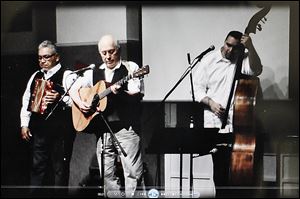
Songs for Justice to benefit FLOC on Saturday
Lyrics recall farm labor struggles
6/21/2013
In 2003, Luis Ramirez stood in a tobacco field near Enfield, N.C., where his brother, Urbano Ramirez, was last seen alive. Proceeds from ‘Urbano's Song’ go to his widow and three children.
ASSOCIATED PRESS

In 2003, Luis Ramirez stood in a tobacco field near Enfield, N.C., where his brother, Urbano Ramirez, was last seen alive. Proceeds from ‘Urbano's Song’ go to his widow and three children.
He was left to roast to death in a North Carolina tobacco field after complaining of heat exhaustion.
Migrant worker Urbano Ramirez’s badly decomposed body was found nine days later after several other worried migrant workers walked more than seven miles until they reached the now abandoned field. The body of 34-year-old Mr. Ramirez was decomposed beyond recognition and could only be identified by the Mexican driver’s license in his pocket.
“He was left to rot under a tree,” said Baldemar Velasquez, president of the Toledo-based Farm Labor Organizing Committee, which got involved in the 2001 incident. “The crew leader had told him to stay there and left him to die.”
The farm labor organization used the incident to push for stronger safety and health measures for farm workers nationwide.
It’s one of many battles the farm labor organization has been at the forefront of since forming in the mid-1960s.
At 7 p.m. Saturday, the labor group will celebrate its history and accomplishments through stories and songs. The event, which is called “Songs for Justice” is open to the public. The program will be at the Farm Labor Organizing Committee headquarters at 1221 Broadway.
Tickets are $20 per person and seating is limited. To reserve, or purchase a ticket, contact the organization at 419-243-3456.
“Songs for Justice is a way to raise funds so that we can continue our campaigns, like the one against Reynolds, where we want the tobacco company to guarantee labor rights for thousands of tobacco farm workers,” said Baldemar Velasquez, the founder and president of FLOC.
Proceeds also will be used to continue efforts to address issues such as housing, as well as health and safety violations across the country, he said.
The music performed will be primarily traditional Mexican folk songs associated with farm worker struggles.
Other selections are well-known protest songs, or reworked Tejano or country songs associated with specific memories or accomplishments during the organization’s history.
The group, which is known as the Aguila Negra Band, includes Mr. Velasquez on lead vocals and guitar; Johnny Vasquez, a well-known Tejano accordion player from Lansing, and Rolando Revilla, Jr., a professional musician/bass player from Toledo.
“It will be acoustic folk music performed similar to how they were done in rural communities,” Mr. Velasquez said.
It’s a strong tradition still practiced in rural parts of Mexico, in migrant housing camps in the United States, and neighborhoods with large Mexican-American populations.
One selection to be performed Saturday, is “Urbano’s Song.”

Accordian player Johnny Vassquez, guitarist Baldemar Velasquez, and bassist Ronaldo Revilla, Jr., are to perform at the Songs for Justice fund-raiser scheduled for Saturday at the Farm Labor Organizing Committee headquarters on Broadway.
The song was written and recorded by Mr. Velasquez more than a decade ago in honor of Mr. Ramirez who died in the tobacco field. Proceeds from that CD go to Mr. Ramirez’s widow and three children.
After the farm worker’s death, investigators discovered that Mr. Ramirez and other migrant workers were being denied medical care and water was not available while they worked in the fields.
The owner of the tobacco farm was fined $1,850 because the crew leader had been selling beer to workers in the fields.
Mr. Velasquez’s organization in 2004 negotiated a $110,000 settlement on behalf of the Ramirez family.
Other songs to be performed include “Deportees,” which was written by folk legend Woody Guthrie about a plane wreck at Los Gatos Canyon in California in the 1930s.
“The plane was full of undocumented workers being deported to Mexico no different than the current deportees of today,” Mr. Velasquez said.
Contact Federico Martinez at fmartinez@theblade.com or 419-724-6154.